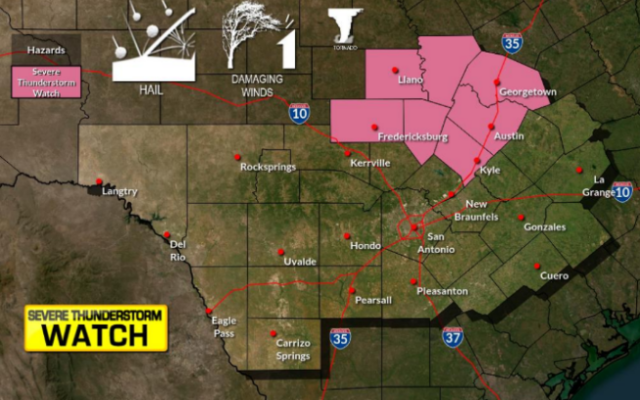Many rural Texas counties currently left out of federal disaster aid eligibility for winter storm

| The Texas Tribune |
When last week’s winter storm raged through Texas, Elizabeth Gonzalez’s family lost power for days.
They had a backup generator, which was enough to power the medical devices needed for her disabled husband’s nightly at-home dialysis treatment and a feeding machine for her daughter who she says is mentally and physically disabled. But it wasn’t large enough to power the entire house. They braved the freezing temperatures under blankets.
Eventually, the water pipes underneath her home burst, flooding the foundation below. She said she can’t afford to pay the damages — or the water bill. She works full-time at Walmart and she said she has been the sole provider of her family these past two years.
But because Gonzalez, 41, lives in Woodsboro, a small town of fewer than 2,000 people about an hour north of Corpus Christi, she can’t immediately access federal disaster aid. Refugio County does not fall under President Joe Biden’s major disaster declaration, which currently covers 108 Texas counties.
During last week’s storm, which brought power outages and water disruptions to millions of Texans across the state, Gov. Greg Abbott requested a federal disaster declaration for all of Texas’ 254 counties. Biden approved a major disaster declaration for 77 on Saturday, and then another 31 two days later. That made residents of those counties eligible for individual assistance that their insurance won’t pay for. All 254 counties were initially approved for federal public assistance, which covers emergency protective measures.
State and local officials say the federal government moved swiftly to approve declarations for the 108 counties — and that more are likely coming as reports of damage mount. As of Monday, the Federal Emergency Management Agency had registered around 113,000 homes for aid, state officials said.
Eighteen of the state’s 20 most populous counties were included in the declarations. But for the 146 counties — many of them rural — not yet approved by the Biden administration, the wait is nerve wracking.
On Thursday, the state reiterated its request to the Biden administration for a major disaster declaration in 54 counties, including Refugio County, left off the list.
“Our partnership with FEMA and the Biden Administration has opened up crucial resources for several of our communities — but there are still many counties who need this federal assistance as they recover from this winter storm,” Abbott said in a statement.
Gonzalez said she’s frustrated her family can’t get the help they need from the federal government. Her 76-year-old father, who lives in a trailer on a fixed income, also had his pipes burst and he doled out hundreds of dollars for damages.
“I feel forgotten,” she said. “All you hear about is these big cities and I know they went through the same thing that we did during the snowstorm. But there are people in these counties who are hurting right now.”
Texas officials note that rural counties weathered the same storm and outages as the rest of the state.
“This whole thing was very difficult for everybody in the state,” state Sen. Kel Seliger, R-Amarillo, told The Texas Tribune. “To pick some counties and provide aid to them but then provide none for counties who were hard hit by the storm, there is no explanation and I haven’t heard one from the administration.”
Not a single county that falls under the current major disaster declaration is in Seliger’s district, which encompasses the northern part of the Panhandle, the area west of Lubbock, and Odessa. Seliger said the aftermath of the storm has been “very, very difficult” for his constituents who don’t qualify for federal disaster aid.
Nim Kidd, chief of the Texas Division of Emergency Management, told the Senate Finance Committee on Monday that the state is urging residents to report their property damage through an online damage assessment tool. State officials will then report that damage to FEMA in hopes it will lead to more counties being added to the major disaster declaration.
“Had it been the world according to Nim Kidd, we would have had all 254 counties approved at the same time, because I genuinely believe according to my professional experience they are all going to qualify,” Kidd said, adding that “we are going to continue to flood them with data” to get more counties approved.
Earl Armstrong, a FEMA spokesperson, said in a statement to the Tribune that homeowners and renters who don’t live in a disaster-designated county should file a claim with their insurance provider, document damage to their home from the storm, and keep receipts for all expenses related to repairs.
“There are several factors that go into making a determination that the situation is of such severity and magnitude to declare a major disaster for individual assistance, such as, impact to community infrastructure, and uninsured home and personal property loss,” Armstrong said. “Some of the data that was used to assess impacts was the state’s self-reported damage data as well as extended power outage information. Additional designations may be made at a later date if warranted by the results of additional data and further assessments.”
On Thursday, Abbott’s office announced that TDEM, along with the assistance of the Texas Military Department, introduced a call center for Texans with limited internet access to submit information about damage to their homes. Texans can call 844-844-3089 between 8 a.m. to 8 p.m. seven days a week to report.
“Texans are urged to fill out the iSTAT, either online or over the phone if internet access is limited, to help the state identify damages across Texas and help emergency management officials gain an understanding of damages that occurred during the recent severe winter weather event. This data is also needed to provide information to FEMA and highlight the need for federal disaster assistance for individuals,” a statement said.
For the counties that currently don’t qualify for disaster aid, their only hope for assistance is from volunteer groups and they can only do so much, according to Hannah Dyal, a staff attorney with the Texas RioGrande Legal Aid and an Equal Justice Works disaster resiliency fellow.
“Our opinion is that surveys are good. But that being the only mechanism that the state and federal government use to determine who gets federal assistance is not very not equitable for rural counties,” Dyal said. “Getting the declaration quickly is pretty important. And the longer it takes for rural counties to get that declaration, it just puts them at a tougher spot.”
Dyal said the “mechanism for declaring FEMA should be tailored to the county and the mechanism for collecting the damage should be tailored to the county too.”
She said rural counties that might not have access to the internet to report the damages, compared to big cities, have been at a disadvantage.
Meanwhile, Biden will visit Texas on Friday. Abbott said he’ll request help for the people whose counties aren’t on the current major disaster list.
“We will express our gratitude for the major disaster that has already been declared but also explain the need to expand that to additional counties,” Abbott said at a press conference Thursday.
Counties included in major disaster declaration
Here are the counties under a major disaster declaration, whose residents can begin applying for FEMA assistance, according to the White House and Gov. Greg Abbott’s office:
Anderson, Angelina, Aransas, Austin, Bastrop, Bee, Bell, Bexar, Blanco, Bosque, Bowie, Brazoria, Brazos, Brown, Burleson, Burnet, Caldwell, Calhoun, Cameron, Chambers, Cherokee, Collin, Colorado, Comal, Comanche, Cooke, Coryell, Dallas, Denton, DeWitt, Ellis, Erath, Falls, Fannin, Fort Bend, Freestone, Galveston, Gonzales, Gillespie, Grimes, Guadalupe, Grayson, Gregg, Hardin, Harris, Harrison, Hays, Henderson, Hidalgo, Hill, Hood, Houston, Hunt, Jackson, Jasper, Jefferson, Jim Wells, Johnson, Jones, Kaufman, Kendall, Lavaca, Liberty, Limestone, Lubbock, Madison, Matagorda, Maverick, Medina, McLennan, Milam, Montague, Montgomery, Nacogdoches, Navarro, Nueces, Orange, Palo Pinto, Panola, Parker, Polk, Rockwall, Rusk, Sabine, San Jacinto, San Patricio, Scurry, Shelby, Smith, Stephens, Tarrant, Taylor, Tom Green, Travis, Tyler, Upshur, Van Zandt, Val Verde, Victoria, Walker, Waller, Washington, Wood, Wharton, Wichita, Williamson, Wilson and Wise.
![]()
You Might Also Like



